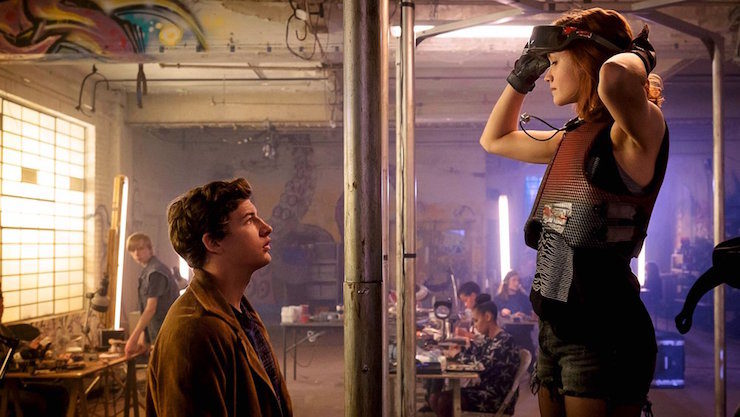I love Ernest Cline’s novel Ready Player One. I love it so much, it’s among the handful of titles that I re-read annually. I love the popular culture references, the throwbacks, the easter eggs, and I especially love the audiobook version narrated by Wil Wheaton.
What I don’t love is the way the character of Art3mis is treated like a side quest, some challenge to be conquered by our torch-bearing hero. It happens in actual video games, too: my game of choice is The Legend of Zelda. I mean, her name is literally in the title and yet the character of Zelda (in all her reiterations) is hardly seen; instead, players run around the land of Hyrule as Link. In some versions of the game, Zelda doesn’t appear at all. Before I started playing, I even thought Link’s name was Zelda because, well, why wouldn’t the eponymous character appear as a major player in the game that features her name?
The importance of representation in fiction cannot be overstated, but when it comes to women who game we are still often relegated to being Player Two. Or, worse yet, the princess who needs rescuing.
Luckily, there are plenty of novels out there that put women gamers front and center. That said, I had an impossible time finding anything resembling a gender-swapped RPO marketed to adults: these books are all YA and center on teenage girls (of course, Wade is also a teenager and yet Ready Player One is marketed as an adult novel, but that’s another post for another day). I see the fact that these are all young adult novels as a feature, not a bug, however: Girls and women of all age groups need to know that both their agency and their interest in video games is valid—the earlier the better.
Arena by Holly Jennings
 Virtual Gaming League’s RAGE tournaments are broadcast to millions of viewers, and Kali made history when she was chosen as their first ever female captain (apparently there are still glass ceilings to break in 2054). The world might be virtual and the deaths only digital, but real life strength and skills are what separate the winners from the losers, and Kali’s team is heavily favored.
Virtual Gaming League’s RAGE tournaments are broadcast to millions of viewers, and Kali made history when she was chosen as their first ever female captain (apparently there are still glass ceilings to break in 2054). The world might be virtual and the deaths only digital, but real life strength and skills are what separate the winners from the losers, and Kali’s team is heavily favored.
Kali might be on top of the world inside RAGE, but outside she and her fellow professional gamers are treated as commodities to be traded and sold to the public and sponsors. Players are expected to party hard, which has unintended consequences when one of Kali’s teammates overdoses on the newest designer drug. The death is covered up by those in charge and tensions rise among the team as they struggle to deal with new personalities while training for the upcoming tournament.
Author Holly Jennings followed Arena up with a sequel, Gauntlet, and had plans for a longer series, but unfortunately her publisher didn’t agree and she’s put it on the back burner for now; hopefully she’ll find another place for the series in the future.
Bluescreen by Dan Wells
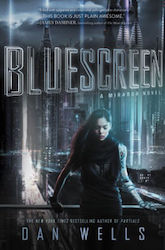 Dan Wells’ novel features an element right out of an episode of Black Mirror: a chip that, when implanted, connects a person’s brain directly to the internet. In a future where computer viruses and hackers still exist, what could possibly go wrong with this scenario?
Dan Wells’ novel features an element right out of an episode of Black Mirror: a chip that, when implanted, connects a person’s brain directly to the internet. In a future where computer viruses and hackers still exist, what could possibly go wrong with this scenario?
It’s 2050, and Marisa and the Cherry Dogs—her group of gaming friends, some of whom she knows IRL, others only virtually—want to be professional gamers. They live and breathe the internet. Literally, in fact: in this world, people essentially have smartphone technology in their head. It’s how they shop, how they go to school, how they interact and, naturally, how they get high.
Bluescreen is a digital drug that, at first glance, appears to be harmless and merely the newest way to reach nirvana. But when one of Marisa’s friends gets her hands (or brain, as it were) on bluescreen, Marisa realizes that the drug has some nefarious and unintended consequences. In her effort to discover who—or what—is behind bluescreen, she finds herself caught like a fly in the world wide web.
Deadly Pink by Vivian Vande Velde
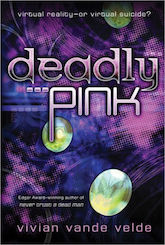 This book includes not just one but two female characters: a pair of sisters, Emily and Grace. Emily, the oldest, is known as both the brains and the beauty, and works as a programmer for video game company Rasmussem. It would seem that Emily has it all—which makes her decision to immerse herself completely into a game called “Land of the Golden Butterflies” all the more surprising. Worse yet, she has put her coding powers to use, making it impossible for anyone to eject her from the game.
This book includes not just one but two female characters: a pair of sisters, Emily and Grace. Emily, the oldest, is known as both the brains and the beauty, and works as a programmer for video game company Rasmussem. It would seem that Emily has it all—which makes her decision to immerse herself completely into a game called “Land of the Golden Butterflies” all the more surprising. Worse yet, she has put her coding powers to use, making it impossible for anyone to eject her from the game.
The game may be virtual, but sessions that run too long can have physical effects. This goes beyond an avatar merely losing hearts: if Emily stays in too long she could die. Grace reluctantly enters the game in an attempt to convince Emily to return to the real world. To Grace’s dismay, however, instead of the type of action adventure game she normally enjoys playing, she finds herself in a hyper-feminine pink world of butterflies and sparkles. The story becomes a race against the clock—and Emily’s coding—as Grace attempts to save her sister before she herself is also permanently sucked into the game.
This particular title does fall on the younger end of the age spectrum but is perfect for those budding young coders.
For the Win by Cory Doctorow
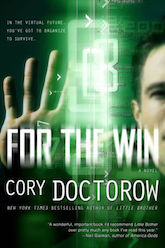 Doctorow’s For the Win centers around the concept of “gold farming” in an MMORPG. Whether they are off on a side quest with a treasure chest at the end or battling other players in the world, the end goal is the same: collect as much gold, jewels, and treasure as possible.
Doctorow’s For the Win centers around the concept of “gold farming” in an MMORPG. Whether they are off on a side quest with a treasure chest at the end or battling other players in the world, the end goal is the same: collect as much gold, jewels, and treasure as possible.
In the real world, those in power seek to exploit the farming frenzy by instituting electronic sweatshops: young adults in Third World nations are forced to farm for their employers, who turn around and sell the gold and jewels in exchange for real money from rich individuals willing to pay to play, if it means leveling up their avatar.
Soon, the overworked and underpaid exploited farmers realize they are the ones who truly hold the power. From across all corners of the globe they unionize and rise up, led by the mysterious and shadowy character Big Sister Nor.
The Leveller by Julia Durango
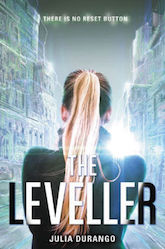 Author Julia Durango takes the old stereotype of gamers living on a couch in their parents basement to a new level with her virtual world, known as the MEEP. Here, kids play entirely with their minds, their bodies lounging comatose in the house. That’s where Nixy comes in: frustrated parents hire Nixy to drag their children out of the virtual world and back to the real world.
Author Julia Durango takes the old stereotype of gamers living on a couch in their parents basement to a new level with her virtual world, known as the MEEP. Here, kids play entirely with their minds, their bodies lounging comatose in the house. That’s where Nixy comes in: frustrated parents hire Nixy to drag their children out of the virtual world and back to the real world.
Unsurprisingly, this does not make Nixy popular among her peers.
But then things get complicated when the MEEP’s billionaire developer contacts her with a job opportunity. His son Wyn is gone, lost in the MEEP, having left behind a suicide note. Nixy’s job is to now to find and save Wyn.
Once she takes the job, though, she discovers Wyn didn’t go voluntarily. Instead, he’s being held hostage, and Nixy’s job now becomes a rescue mission unlike any other she’s had before.
Warcross by Marie Lu
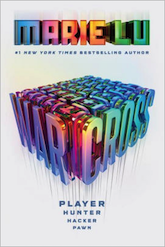 Emika is a bounty hunter. Her job is to find the players placing illegal bets on Warcross, the virtual reality game that has taken the world by storm. It’s a tough business and in an effort to make ends meet, Emika sees an opportunity to hack into the International Warcross Championships to take down her latest target.
Emika is a bounty hunter. Her job is to find the players placing illegal bets on Warcross, the virtual reality game that has taken the world by storm. It’s a tough business and in an effort to make ends meet, Emika sees an opportunity to hack into the International Warcross Championships to take down her latest target.
Unfortunately, that hack turns into a glitch, and suddenly her name and face are broadcast everywhere.
Thankfully, the creator of Warcross needs a spy and Emika has just unintentionally interviewed for the job. Her technical skills land her a role as the newest member of the Warcross games and between training for the upcoming tournament, she has to also deal with her newfound fame and fortune—all while trying to uncover a plot from the inside. But the deeper she goes in her search for the truth, the more she discovers all is not what it seems.
Jill Grunenwald is an INTJ Slytherin librarian and author of the memoir Running With a Police Escort: Tales from the Back of the Pack. She lives in Cleveland, where she is a staff librarian at OverDrive and co-host of the Professional Book Nerds podcast. Her three favorite words are All Day Breakfast. Jill can be found on Twitter.










